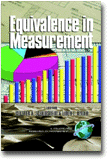
Equivalence in Measurement
Equivalence-in-Measurement
Edited by:
Chester A. Schriesheim, University of Miami
Linda L. Neider, University of Miami
A volume in the series: Research in Management. Editor(s): Timothy Ewest, Houston Baptist University.
Published 2001
This volume highlights research and conceptual insights into one of the most basic, and yet, perplexing research issues in management-handling and assessing the comparability of our measurement devices across groups and measures. One of the most consistently difficult concerns in management research over the past three decades has been trying to reconcile measurement equivalence issues utilizing diverse samples. Given the emphasis on diversity in the human resources area and the internationalization of business and management, measurement equivalence is more of a general concern now than ever before. If we are not able to successfully address concerns about measurement equivalence, research examining differences between groups could be highly misleading and/or erroneous. Consequently, we hope that the thoughtful contributions of the scholars in this volume will help future scholars to better address measurement equivalence concerns.
CONTENTS
Forward and Commentary, Chester A. Schriesheim and Linda L. Neider. Male and Female Interpretations of Bidirectional Work-Family Conflict Scales: Testing for Measurement Equivalence, Bruce W. Eagle, Edward W. Miles, and Marjorie L. Icenogle. Measuring Invariance Using Confirmatory Factor Analysis and Item Response Theory: Perceptions of Organizational Politics in the United States and the Middle East, Terri A. Scandura, Ethlyn A. Williams, and Betti A. Hamilton. The Importance of Measurement Equivalence in Transnational Research: A Test of Individual-Level Predictions About Culture and The Differential Use of Organizational Influence Tactics, With and Without Measurement Equivalence, Xiaohua Zhou, Chester A. Schriesheim, and Wolfgang Beck. Testing for Metric Invariance Using Structural Equation Models: Solving the Standardization Problem, Roger B. Rensvold and Gordon W. Cheung. Alpha, Beta, and Gamma Change: A Review of Past Research With Recommendations, Christine M. Riordan, Hettie A. Richardson, Bryan S. Schaffer, and Robert J. Vandenberg. Identifying the Sources of Non Equivalence in Measures of Job Satisfaction, Vida Scarpello and James C. Hayton.
-
Paperback978-1-930608-88-7
Web price: $45.04 (Reg. 52.99)
-
Hardcover978-1-930608-89-4
Web price: $80.74 (Reg. 94.99)
- eBook9781607525431

-
 Advances in Authentic and Ethical Leadership
Advances in Authentic and Ethical Leadership
-
 Affect and Emotion
New Directions in Management Theory and Research
Affect and Emotion
New Directions in Management Theory and Research
-
 Current Theory and Research in Transforming Organizations
Current Theory and Research in Transforming Organizations
-
 Perspectives on Justice and Trust in Organizations
Perspectives on Justice and Trust in Organizations
-
 Power and Influence in Organizations
Power and Influence in Organizations
-
 Research in Management International Perspectives
Research in Management International Perspectives
-
 The 'Dark' Side of Management
The 'Dark' Side of Management

